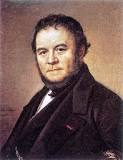The Red and the Black Page #19
Le Rouge et le Noir is a historical psychological novel in two volumes by Stendhal, published in 1830. It chronicles the attempts of a provincial young man to rise socially beyond his modest upbringing through a combination of talent, hard work, deception, and hypocrisy.
The hand was quickly removed, but Julien thought it a point of duty to secure that that hand should not be removed when he touched it. The idea of a duty to be performed and the consciousness of his stultification, or rather of his social inferiority, if he should fail in achieving it, immediately banished all pleasure from his heart. CHAPTER IX AN EVENING IN THE COUNTRY M. Guérin's Dido, a charming sketch!--Strombeck. His expression was singular when he saw Madame de Rênal the next day; he watched her like an enemy with whom he would have to fight a duel. These looks, which were so different from those of the previous evening, made Madame de Rênal lose her head; she had been kind to him and he appeared angry. She could not take her eyes off his. Madame Derville's presence allowed Julien to devote less time to conversation, and more time to thinking about what he had in his mind. His one object all this day was to fortify himself by reading the inspired book that gave strength to his soul. He considerably curtailed the children's lessons, and when Madame de Rênal's presence had effectually brought him back to the pursuit of his ambition, he decided that she absolutely must allow her hand to rest in his that evening. The setting of the sun which brought the crucial moment nearer and nearer made Julien's heart beat in a strange way. Night came. He noticed with a joy, which took an immense weight off his heart, that it was going to be very dark. The sky, which was laden with big clouds that had been brought along by a sultry wind, seemed to herald a storm. The two friends went for their walk very late. All they did that night struck Julien as strange. They were enjoying that hour which seems to give certain refined souls an increased pleasure in loving. At last they sat down, Madame de Rênal beside Julien, and Madame Derville near her friend. Engrossed as he was by the attempt which he was going to make, Julien could think of nothing to say. The conversation languished. "Shall I be as nervous and miserable over my first duel?" said Julien to himself; for he was too suspicious both of himself and of others, not to realise his own mental state. In his mortal anguish, he would have preferred any danger whatsoever. How many times did he not wish some matter to crop up which would necessitate Madame de Rênal going into the house and leaving the garden! The violent strain on Julien's nerves was too great for his voice not to be considerably changed; soon Madame de Rênal's voice became nervous as well, but Julien did not notice it. The awful battle raging between duty and timidity was too painful, for him to be in a position to observe anything outside himself. A quarter to ten had just struck on the château clock without his having ventured anything. Julien was indignant at his own cowardice, and said to himself, "at the exact moment when ten o'clock strikes, I will perform what I have resolved to do all through the day, or I will go up to my room and blow out my brains." After a final moment of expectation and anxiety, during which Julien was rendered almost beside himself by his excessive emotion, ten o'clock struck from the clock over his head. Each stroke of the fatal clock reverberated in his bosom, and caused an almost physical pang. Finally, when the last stroke of ten was still reverberating, he stretched out his hand and took Madame de Rênal's, who immediately withdrew it. Julien, scarcely knowing what he was doing, seized it again. In spite of his own excitement, he could not help being struck by the icy coldness of the hand which he was taking; he pressed it convulsively; a last effort was made to take it away, but in the end the hand remained in his. His soul was inundated with happiness, not that he loved Madame de Rênal, but an awful torture had just ended. He thought it necessary to say something, to avoid Madame Derville noticing anything. His voice was now strong and ringing. Madame de Rênal's, on the contrary, betrayed so much emotion that her friend thought she was ill, and suggested her going in. Julien scented danger, "if Madame de Rênal goes back to the salon, I shall relapse into the awful state in which I have been all day. I have held the hand far too short a time for it really to count as the scoring of an actual advantage." At the moment when Madame Derville was repeating her suggestion to go back to the salon, Julien squeezed vigorously the hand that was abandoned to him. Madame de Rênal, who had started to get up, sat down again and said in a faint voice, "I feel a little ill, as a matter of fact, but the open air is doing me good." These words confirmed Julien's happiness, which at the present moment was extreme; he spoke, he forgot to pose, and appeared the most charming man in the world to the two friends who were listening to him. Nevertheless, there was a slight lack of courage in all this eloquence which had suddenly come upon him. He was mortally afraid that Madame Derville would get tired of the wind before the storm, which was beginning to rise, and want to go back alone into the salon. He would then have remained tête-à-tête with Madame de Rênal. He had had, almost by accident that blind courage which is sufficient for action; but he felt that it was out of his power to speak the simplest word to Madame de Rênal. He was certain that, however slight her reproaches might be, he would nevertheless be worsted, and that the advantage he had just won would be destroyed. Luckily for him on this evening, his moving and emphatic speeches found favour with Madame Derville, who very often found him as clumsy as a child and not at all amusing. As for Madame de Rênal, with her hand in Julien's, she did not have a thought; she simply allowed herself to go on living. The hours spent under this great pine tree, planted by by Charles the Bold according to the local tradition, were a real period of happiness. She listened with delight to the soughing of the wind in the thick foliage of the pine tree and to the noise of some stray drops which were beginning to fall upon the leaves which were lowest down. Julien failed to notice one circumstance which, if he had, would have quickly reassured him; Madame de Rênal, who had been obliged to take away her hand, because she had got up to help her cousin to pick up a flower-pot which the wind had knocked over at her feet, had scarcely sat down again before she gave him her hand with scarcely any difficulty and as though it had already been a pre-arranged thing between them. Midnight had struck a long time ago; it was at last necessary to leave the garden; they separated. Madame de Rênal swept away as she was, by the happiness of loving, was so completely ignorant of the world that she scarcely reproached herself at all. Her happiness deprived her of her sleep. A leaden sleep overwhelmed Julien who was mortally fatigued by the battle which timidity and pride had waged in his heart all through the day.
Translation
Translate and read this book in other languages:
Select another language:
- - Select -
- 简体中文 (Chinese - Simplified)
- 繁體中文 (Chinese - Traditional)
- Español (Spanish)
- Esperanto (Esperanto)
- 日本語 (Japanese)
- Português (Portuguese)
- Deutsch (German)
- العربية (Arabic)
- Français (French)
- Русский (Russian)
- ಕನ್ನಡ (Kannada)
- 한국어 (Korean)
- עברית (Hebrew)
- Gaeilge (Irish)
- Українська (Ukrainian)
- اردو (Urdu)
- Magyar (Hungarian)
- मानक हिन्दी (Hindi)
- Indonesia (Indonesian)
- Italiano (Italian)
- தமிழ் (Tamil)
- Türkçe (Turkish)
- తెలుగు (Telugu)
- ภาษาไทย (Thai)
- Tiếng Việt (Vietnamese)
- Čeština (Czech)
- Polski (Polish)
- Bahasa Indonesia (Indonesian)
- Românește (Romanian)
- Nederlands (Dutch)
- Ελληνικά (Greek)
- Latinum (Latin)
- Svenska (Swedish)
- Dansk (Danish)
- Suomi (Finnish)
- فارسی (Persian)
- ייִדיש (Yiddish)
- հայերեն (Armenian)
- Norsk (Norwegian)
- English (English)
Citation
Use the citation below to add this book to your bibliography:
Style:MLAChicagoAPA
"The Red and the Black Books." Literature.com. STANDS4 LLC, 2025. Web. 10 Mar. 2025. <https://www.literature.com/book/the_red_and_the_black_201>.








Discuss this The Red and the Black book with the community:
Report Comment
We're doing our best to make sure our content is useful, accurate and safe.
If by any chance you spot an inappropriate comment while navigating through our website please use this form to let us know, and we'll take care of it shortly.
Attachment
You need to be logged in to favorite.
Log In